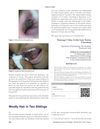 February 2024 in “Curēus”
February 2024 in “Curēus” A balanced diet with proteins, vitamins, and minerals is crucial for managing skin disorders.

The study concluded that Frontal fibrosing alopecia can affect younger people, is often missed in men, and may be autoimmune-related.
 5 citations,
September 2021 in “Southern African Journal of Hiv Medicine”
5 citations,
September 2021 in “Southern African Journal of Hiv Medicine” The guideline provides healthcare professionals in South Africa with instructions for comprehensive, multidisciplinary gender-affirming care, including HIV prevention and treatment for transgender and gender diverse individuals.
 January 2023 in “International journal of homoeopathic sciences”
January 2023 in “International journal of homoeopathic sciences” The document says homoeopathic treatments are good for hair regrowth in alopecia areata but doesn't give proof.
 January 2012 in “International Journal of Trichology”
January 2012 in “International Journal of Trichology” Two siblings have a rare genetic condition causing curly, coarse hair.
 2 citations,
December 2012 in “Acta Facultatis Medicae Naissensis”
2 citations,
December 2012 in “Acta Facultatis Medicae Naissensis” A man with HIV had hair loss due to syphilis, which improved after penicillin treatment.
 17 citations,
January 2015 in “Current problems in dermatology”
17 citations,
January 2015 in “Current problems in dermatology” Understanding and treating hair disorders in different ethnic groups requires knowledge of specific hair care practices and hair characteristics.
 October 2018 in “InTech eBooks”
October 2018 in “InTech eBooks” The most effective treatments for hair loss are minoxidil, finasteride, PRP, and hair transplants, with steroids and immunosuppressants for autoimmune types.
 August 2022 in “IntechOpen eBooks”
August 2022 in “IntechOpen eBooks” The best treatment for Frontal Fibrosing Alopecia and Lichen Planopilaris combines oral and topical medications to reduce symptoms and stop hair loss.
 31 citations,
May 2008 in “Drug Discovery Today: Disease Mechanisms”
31 citations,
May 2008 in “Drug Discovery Today: Disease Mechanisms” Different hair growth problems are caused by genetic issues or changes in hair growth cycles, and new treatments are being developed.
 November 2023 in “International journal of biology, pharmacy and allied sciences”
November 2023 in “International journal of biology, pharmacy and allied sciences” Herbal treatments can help with hair problems, but more research is needed.
 121 citations,
May 2009 in “Journal of Ethnopharmacology”
121 citations,
May 2009 in “Journal of Ethnopharmacology” Eclipta alba extract may help hair grow similarly to Minoxidil.
 30 citations,
May 2018 in “Experimental Dermatology”
30 citations,
May 2018 in “Experimental Dermatology” The conclusion is that future hair loss treatments should target the root causes of hair thinning, not just promote hair growth.
 23 citations,
December 2013 in “Regenerative Medicine”
23 citations,
December 2013 in “Regenerative Medicine” Hair follicle culture helps develop new treatments for hair loss.
 August 2018 in “SDÜ SAĞLIK BİLİMLERİ DERGİSİ”
August 2018 in “SDÜ SAĞLIK BİLİMLERİ DERGİSİ” No method fully prevents hair loss from chemotherapy, but some methods can reduce it and improve quality of life.

Some vaccines, like the hepatitis B vaccine, might be linked to the hair loss condition Alopecia Areata, but more research is needed.

Hormonal treatments can help with hair loss, acne, and excess hair growth, but it takes 3-6 months to see results and patients should know the possible side effects.
 14 citations,
September 2010 in “Annals of Plastic Surgery”
14 citations,
September 2010 in “Annals of Plastic Surgery” Hair restoration has evolved from surgery to drugs to potential gene therapy, with improved results and ongoing research driven by high demand.

Hair loss can cause significant social and emotional issues, especially for women and young men.
 10 citations,
August 2019 in “The World Journal of Men's Health”
10 citations,
August 2019 in “The World Journal of Men's Health” Kimchi probiotics slightly improved hair density, but more research needed.
1 citations,
December 2023 in “International journal of molecular sciences” miR-199a-3p controls hair growth and is linked to alopecia areata.
 41 citations,
April 2010 in “Gender Medicine”
41 citations,
April 2010 in “Gender Medicine” The conclusion is that hirsutism should be diagnosed and treated because it affects quality of life and may signal other health problems.
 November 2023 in “Materials Today Bio”
November 2023 in “Materials Today Bio” Light therapy might help treat hereditary hair loss by improving hair follicle growth in lab cultures.
 February 2024 in “International neuropsychiatric disease journal”
February 2024 in “International neuropsychiatric disease journal” Alopecia areata severely impacts quality of life, mental health, and work productivity.
 82 citations,
May 2016 in “Best Practice & Research in Clinical Obstetrics & Gynaecology”
82 citations,
May 2016 in “Best Practice & Research in Clinical Obstetrics & Gynaecology” The conclusion is that managing androgen excess requires long-term treatment, including hormonal contraceptives and androgen blockers, with follow-up after six months.
1 citations,
April 2022 in “Journal of Ayurveda and integrative medicine” Blumea eriantha DC extract shows strong potential for promoting hair growth.
 January 2023 in “International journal of biological sciences”
January 2023 in “International journal of biological sciences” COX2 and ATP synthase control the size of hedgehog spines.
 2 citations,
August 2022 in “JAAD case reports”
2 citations,
August 2022 in “JAAD case reports” COVID-19 vaccines may rarely worsen hair loss in people with severe alopecia, but the benefits of vaccination still outweigh this risk.

Nanocarriers with plant extracts show promise for safe and effective hair growth treatment.
 5 citations,
January 2020 in “The mental health clinician”
5 citations,
January 2020 in “The mental health clinician” Vitamin D supplements may reduce hair-pulling in people with Trichotillomania.




























